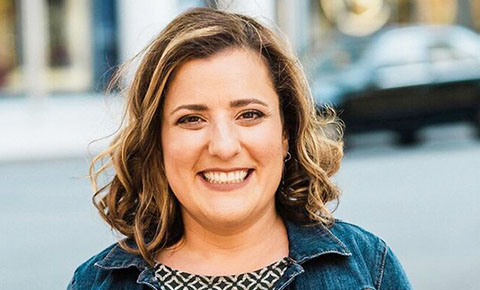Hunger and College Campuses: Sara Goldrick-Rab Delivers Upcoming Loeschner Lecture

Sara Goldrick-Rab, whose research inspired the documentary film “Hungry to Learn,” will speak on hunger and food insecurity among college students in the next installment of the School of Education and Social Policy's Nancy and Ray Loeschner Leadership Series at Northwestern University.
The virtual event, moderated by School of Education and Social Policy Dean David Figlio, starts at 4 p.m. Oct. 28. The film can be viewed on yahoo!life in advance. Please register here for the event as soon as possible.
Goldrick-Rab, professor of sociology and medicine at Temple University, has been called “a defender of impoverished students and a scholar of their struggles,” by the Chronicle of Higher Education.
She is best known for her innovative research on food and housing insecurity in higher education, having led the five largest national studies on the subject, and for her work on making public higher education free.
"Hungry to Learn," produced by Emmy- and Peabody Award-winning broadcaster Soledad O'Brien, follows four college students who often don’t know where they will get their next meal. The film features Goldrick-Rab’s work as director of the Hope Center for College, Community, and Justice in Philadelphia.
Goldrick-Rab is also the chief strategy officer for Emergency Aid at Edquity, a student financial success and emergency aid company. She founded Believe in Students, a nonprofit distributing emergency aid.
Experts like Goldrick-Rab expect the problem of hunger on college campuses will grow worse due to the twin health and economic crises caused by the global COVID-19 pandemic. A survey of 38,000 students by the Hope Center found that 58 percent of those who responded were experiencing basic needs insecurity during the pandemic, meaning they lacked food, housing, and other needs. That rate did not differ between two-year and four-year institutions.
“Seventy percent of the students we surveyed had been working,” Goldrick-Rab told yahoo!life. “One third of those students lost their jobs. And another third of them had their hours cut or their pay cut in some way. The food insecurity rate is much, much higher when those job losses happened. People cannot pay the bills.”
But while Congress has suspended the work requirement associated with SNAP for regular people, says Goldrick-Rab, they haven’t done the same for college students.
Goldrick-Rab has received the William T. Grant Foundation’s Faculty Scholars Award, the American Educational Research Association’s Early Career Award, and the Carnegie Fellowship. In 2016 POLITICO magazine named her one of the top 50 people shaping American politics, and she is ranked 7th in the nation among education scholars according to Education Week.
Her latest book, Paying the Price: College Costs, Financial Aid, and the Betrayal of the American Dream, won the 2018 Grawemeyer Award, and was featured on The Daily Show with Trevor Noah. Soledad O’Brien named Goldrick-Rab her “food policy hero.”
Loeschner Lecture features diverse leaders
Goldrick-Rab is the eighth distinguished speaker in the Loeschner Leadership series, which began in 2013 and presents visionary trailblazers in education and other fields.
Previous events included Steven Romick, portfolio manager at First Pacific Advisors; Anthony Jack, assistant professor at Harvard University and author of The Privileged Poor: How Elite Colleges Are Failing Disadvantaged Students; Mary Daly, president and chief executive officer of the Federal Reserve Bank of San Francisco; Eve Ewing, writer and sociologist of education at the University of Chicago; alumnus Chuck Friedman, corporate vice president of Microsoft Edge; Mischa Fisher, economist and data scientist; Eva Moskowitz, founder and CEO of Success Academy Charter Schools; and Wendy Kopp, founder of Teach for America.
The lecture was established with a gift from SESP alumnus Ray Loeschner (MA57) of Grand Rapids, Michigan, the former president of Olivet University and a pioneer in higher education. Loeschner also received his PhD from Northwestern in 1962 and served as an assistant football and track coach.